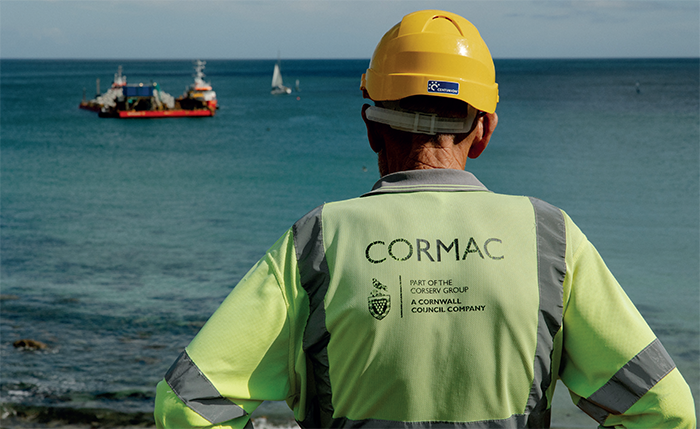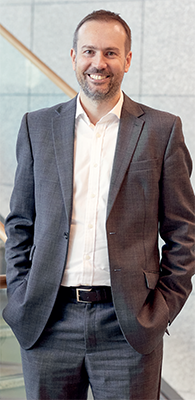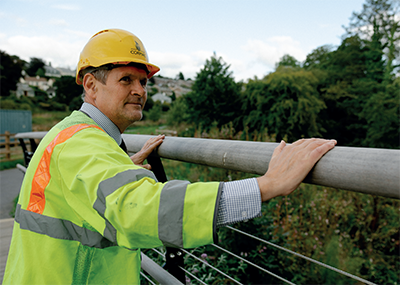
Cormac Ltd may be an enterprise that is part-private and part-public, but at its core sits environmental alignment, sustainability and increasingly, a growing social value culture
The Teckal exemption allows for local authorities to establish an arms-length, limited company, and is the legislation under which the Call Serve Group operates. This is Cornwall Council’s group of companies, made up of five subsidiaries including: Cornwall Housing, Newquay Airport Ltd, a facilities and management business, a care company and Cormac Solutions Ltd (Cormac). Founded in 2012, Cormac is a local authority company, wholly owned by the council, which provides services both to itself as a department and elsewhere commercially.
 Dominic Bostock, Cormac Managing Director, describes the ownership of the business further: “I always say that the hybrid nature of the organisation is truly what makes us unique. We are not strictly public sector but, at the same time, we are very much owned by the public sector and carry its ethos and responsibilities, however, we combine this with our private-sector, commercial flair. This is the blend that I have been working to maintain since I became MD, an important balance in instilling the requisite confidence in our shareholder, the council.
Dominic Bostock, Cormac Managing Director, describes the ownership of the business further: “I always say that the hybrid nature of the organisation is truly what makes us unique. We are not strictly public sector but, at the same time, we are very much owned by the public sector and carry its ethos and responsibilities, however, we combine this with our private-sector, commercial flair. This is the blend that I have been working to maintain since I became MD, an important balance in instilling the requisite confidence in our shareholder, the council.
“The mission of the company has always been aligned to Cornwall and working together to improve the lives of the people who live here. It’s very aligned to our council ownership and our role within the local society and communities. We have three primary strands of activity. The first is the value that we create for communities in Cornwall, through the vision of our turn services, and the second is rooted in the major infrastructure and civil engineering that we are designing and building to contribute to the area’s economic growth. Finally, our third strand is what we refer to as regional business, which covers our contracts and revenue with external organisations, private-sector clients and other local authority customers, outside of Cornwall council.
“Establishing these three strands of the business has been my focus for the last 18 or so months, along with assigning clear objectives to each to create an organisational structure in terms of accountability,” he continues. “Meaning that my business director for term services is on course to delivering maintenance ministrations to the council, as is my director for infrastructure for providing D&B solutions for urban extensions, which will ultimately ensure residential and commercial growth in the area.”
Cormac Business Development supports these strands by leading a four year plan of strategic growth, aligning with like-minded organisations who carry similar values in the region. Business Development is proactive at business and charitable events, driving the social value message, and encouraging engagement to schools, colleges and career based events.
The largest project that Cormac currently has on its books is the £30 million Langarth Garden Village in Truro, which is essentially an urban expansion set to bring up to 3550 new homes as well as schools, health facilities and workspaces over the next 25 years. The business is also constructing an 80-meter-long, rock-armour revetment to work as a sea defence at North Corner Cliff, Coverack Beach, as well as the St Austell Bay Resilient Regeneration (STARR) initiative to reduce the risk of flooding to local communities.
“Our director for the regional business side has got a real focus on growing geographically within the south west and has been winning work with Devon Council and other clients further outside of Cornwall,” Dominic explains. “One of our key metrics is the measurement of how our revenue breaks down and this financial year we are anticipating that around 80 per cent will be with Cornwall council, with the remaining 20 coming in from a number of other organisations, accumulating to around £110 million turnover. Our current four-year plan is to get that revenue split closer to 50-50.”
Dominic cites Cormac’s infrastructural opportunities for growth, such as homes, workplaces and sustainable communities, as being the projects that best depict the company and its qualities. These are in line with Cornwall’s local plans for ongoing expansions, which highlight all three as key necessities. “I can count three projects we currently have on the go; two of which are in the construction phase and one that is soon to be, where we will be providing the means for further local growth. Another interesting aspect to our region is drainage, something that we are working with to help deal with flooding, however it’s ultimately the effects of climate change that we’re working against. Water is going to be increasingly problematic for us.
“We are completing a development at St Austell at the moment, with the aim to reduce the flood risk to an area that, prior to this, couldn’t be developed. The STARR project is a collaboration between South West Water, the Environment Agency and Cornwall council to alleviate these issues to enable future regeneration. It’s a combination of what we call blue and green infrastructure, as it isn’t about heavy drainage, but solutions that work through infiltration and use softer, greener techniques as opposed to hard, concrete discharge channels.
“We take great pride in successfully bringing biodiversity and environmental net-gains to areas that we work in and have won multiple awards over the last few years for our work with green infrastructure,” he adds. “The most recent has been Making Space for Nature and prior to that it was a program called Green Infrastructure for Growth, which was focused on creating high-quality, natural spaces for residents and communities to enjoy, whilst also increasing biodiversity and the area’s contribution to sustainability. It’s been great to see the legacy of the volunteer groups that have been established to maintain the estates and the resultant sense of community ownership.”
Sustainability is instrumental to Cormac’s ethos and practices, with its carbon reduction policy having sat high on its agenda for the last few years. Since 2019/2020, the company has already seen a reduction of 14 per cent, but that’s just the beginning. Its plant and fleet emissions make up a large portion of its overall carbon footprint, and although it employed an electrification strategy for its smaller vehicles, this didn’t cover its three and a half to five tonne tippers and load-carrying rigs.
“We have undertaken an R&D program with an organisation called Bennamann over the last couple of years, of which the Core Serve Group is a small shareholder. Between us we have been developing a strategy to use slurry, processed in plants on half a dozen or so local, council-owned farms, to produce a bio-methane alternative fuel to power our larger vehicles. We have had the initial prototype operating for the last 18 months and are now awaiting an order of 12 or 13 additional models of the same kind. Going forwards, we are looking to implement power plants and storage facilities for bio-methane among our network of depots, to hopefully enable us to provide a carbon-neutral, environment maintenance service for Cornwall council and its district.
“Carbon is huge factor for the construction industry,” Dominic concludes. “Reducing our carbon and innovating softer solutions within civil engineering, for me, has become far less about concrete and the impact of using natural resources. The focus has shifted towards creating infrastructure that better interfaces with people, communities and nature.”
www.cormacltd.co.uk